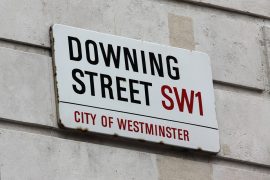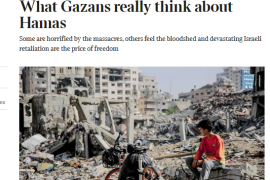An article in The Times (“There’s no saviour in sight for the Holy Land”, Dec. 23) by their Middle East correspondent Richard J. Spencer commented on the op-ed co-written by Justin Welby, the Archbishop of Canterbury, and the Anglican Archbishop of Jerusalem, Hosam Naoum, in the Sunday Times which accused Israel of driving Christians from the Holy Land.
As we noted in our post about the piece by Welby and Naoum, which was widely condemned by the British Jewish community and several prominent politicians, there was almost no real evidence to back up their allegations.
Spencer frames his piece thusly:
The theme of Welby’s article was reasonable enough, drawing attention to a series of attacks on Christian priests and places of worship. What was odd was his failure to identify those responsible: radical Jewish settler groups determined to expand their presence across Jerusalem’s Old City.
However, whilst there have been a some incidents of vandalism in recent years, and verbal insults, Spencer fails to cite even one actual example of physical violence – nor are are any statistics provided – yet alone a “series” of such assaults. Earlier, we tweeted the journalist asking for sources.
Spencer later writes:
“The archbishop got one thing right, however. More than ever this Christmas, the path to war or peace in the Middle East lies through the City of David”.
First, the archbishop did not make this argument in his Sunday Times op-ed.
Moreover, the ‘path to peace in the Mid-East running through Jerusalem’ narrative is a tired cliche that’s been disproven by events over the past couple of years, especially the signing of the Abraham Accords. The fact that Arab states were willing to make peace with Israel regardless of the conflict demonstrates that, contrary to the British media narrative, the question of ‘Palestine’ is NOT the core regional issue.
Spencer continues:
This year’s round of bombing in Israel and Gaza was set off by clashes in east Jerusalem, the casus belli being lawsuits that would give settlers ownership over properties occupied by Palestinian families — Muslim, in this case.
This is simply untrue. The war was “set off” by Hamas’s cynical decision to launch an unprovoked volley of rockets on Israel’s capital – after Palestinian rioting at al-Aqsa – in order to position Hamas as the defender of Jerusalem and the city’s holy places and establish itself as an alternative to Fatah.
Later, in an effort to place the issue of Christians in the region in a broader perspective, Spencer argues that the reason why the US can’t extricate itself from the Mid-East is its security guarantee to Israel:
President Biden has promised, like both his predecessors, to “withdraw” from the Middle East. This summer’s events in Gaza should remind him that while the incidental causes of US military interventions may be Saddam Hussein’s ambitions or the plight of the Yazidis, the perpetual cause is America’s security guarantee to the state of Israel.
America’s military involvement in the region is based on many factors, depending on the specific theatre. But, it’s hard to understand, for instance, how the 20 year US war in Afghanistan, which the president ended recently, is related to security guarantees to Jerusalem, just as it would be absurd to suggest that American military presence in Syria – primarily designed to help facilitate humanitarian aid and to counter ISIS – is an Israel-centered commitment.
Spencer ends thusly:
It may be that Biden is holding fire, using the [Jerusalem] consulate [issue] as leverage to persuade the Israeli government to accept a new nuclear deal. Or it may be that, as in the past, the alliance between the Israeli right wing and evangelical US politicians with a very different view of the rights of Palestinian Christians from Welby’s have simply won the day. If so, the aggressive, expansionist vision of the “fringe” groups cited in Welby’s article will have another feather in their cap, and there is little that he will be able to do about it.
Even leaving aside Spencer’s awkward attempt to tie together several disparate issues in his closing, his suggestion that an unholy alliance between the ‘Israeli right and evangelical politicians’ may ultimately represent the main force standing in the way of liberating Christians from their Israeli oppressors reinforces Welby’s appallingly dishonest narrative. The fact is that Christians are safer and freer in the Jewish state than in any other Middle East country.
Far from being “driven out” of Israel, the Christian community in the world’s only Jewish state is growing, well-educated, successful and thriving.
Related Posts
BBC touts an unquestioned narrative about ‘Christians in the Holy Land’





